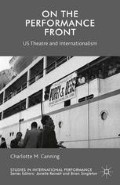Abstract
The International Theatre Institute’s purpose, its charter declared, was “to promote international exchange of knowledge and practice in theatre arts.”1 To this end, every member nation was required to establish and maintain a national center. The various national centers worked with each other and the Paris office for the “collection and diffusion of all types of information in the realm of theatre, the promotion of every initiative in favour of its free development in the world, the encouragement, to the maximum, of exchanges of works and of persons, … and, finally, with the issuance of such publications as may facilitate its activities.”2 Rosamond Gilder, one of ITI’s founding members and head of the US-ITI Center, began one of their first meetings with a fundamental question about ITI itself: “Is it for the good of the theatre or for international understanding through the theatre?”3 C. Robert Kase, who two years earlier had founded the University of Delaware’s theatre department and was representing the American Educational Theatre Association (AETA), spoke quickly: “Both are important. The theatre should come first, but if we don’t have a world we wouldn’t have a theatre, so the secondary objective shouldn’t be lost sight of.” His comment was quickly seconded by Evelyn Burkey, who would later found the Writers Guild of America East.
Access this chapter
Tax calculation will be finalised at checkout
Purchases are for personal use only
Preview
Unable to display preview. Download preview PDF.
Notes
Mark Mazower, No Enchanted Palace: The End of Empire and the Ideological Origins of the United Nations (Princeton University Press, 2009) 194.
Akira Iriye, Cultural Internationalism and World Order (Baltimore: Johns Hopkins University Press, 1997) 65.
As quoted in Jo-Anne Pemberton, “The Changing Shape of Intellectual Cooperation: From the League of Nations to UNESCO,” Australian Journal of Politics and History 58.2 (2012): 39.
Jean-Jacques Renoliet, “L’UNESCO oubliée: l’Organisation de coopération intellectuelle, 1921–1946,” 60 ans de l’histoire de l’UNESCO: actes du colloque international (Paris: UNESCO, 2007) 63.
Pemberton, “The Changing Shape of Intellectual Cooperation,” 40 and Daniel Laqua, “Transnational Intellectual Cooperation, the League of Nations, and the Problem of Order,” Journal of Global History 6.2 (July 2011): 224.
William Langdon Brown, “Firmin Gémier and the Théâtre du Peuple,” diss. (Cornell University, 1978), 151.
As quoted in William Langdon Brown, “Firmin Gémier’s Théâtre National Ambulant,” Theatre Survey 21.2 (May 1980) 47.
Raymond Pentzell, “Firmin Gémier and Shakespeare-for-Everybody,” Tulane Drama Review 11.2 (Summer 1967): 115.
Firmin Gémier, Le théâtre: entretiens réunis par Paul Gsell (Paris: Bernard Grasset, 1923) 243–44, trans. Alexandra K. Wettlaufer and Charlotte Canning. “Nous sommes … impatiemment attendues des transformations nécessaires dans l’organisation intérieure des Etats comme dans leurs relations mutuelles. Au milieu de l’anarchie dont le monde entier souffre jusqu’à la torture, c’est un besoin général de mieux établir les obligations des hommes envers leurs semblables et des peuples entre eux.”
The countries included Austria, Belgium, Brazil, Bulgaria, Canada, China, Denmark, Germany, Great Britain, Greece, Hungary, Holland, Italy, Latvia, Norway, Romania, Russia, Sweden. Premier Congrés International du Théâtre et Premier Festival International d’Art Dramatique et Lyrique (1927): 194.
Irma Kraft, Plays, Players, Playhouses: International Drama of Today (New York: G. Dobsevage, 1928) 3.
Akira Iriye, Global Community: The Role of International Organizations in the Making of the Contemporary World (Berkeley: University of California Press, 2002) 41.
John Lewis Gaddis, We Now Know: Rethinking Cold War History (Oxford University Press, 1997) 196.
Volker R. Berghahn, America and the Intellectual Cold Wars in Europe: Shepard Stone Between Philanthropy, Academy, and Diplomacy (Princeton University Press, 2001) xiii.
Clare Wells, The UN, UNESCO and the Politics of Knowledge (London: Macmillan, 1987) 45.
John Willett, “Erwin Piscator: New York and The Dramatic Workshop 1939–1951,” Performing Arts Journal 2.2 (Winter 1978) 3–16.
Paul Kennedy, The Parliament of Man: The Past, Present, and Future of the United Nations (New York: Random House, 2006) xiv.
Frank Ninkovich, The Diplomacy of Ideas: US Foreign Policy and Cultural Relations, 1938–1950 (Cambridge University Press, 1981) 168.
William Preston Jr, Edward S. Herman, and Herbert I. Schiller, Hope and Folly: The United States and UNESCO 1945–1985 (Minneapolis: University of Minnesota Press, 1989) 5.
Archie Brown, The Rise and Fall of Communism (New York: HarperCollins, 2009) 159.
Eugene Ionesco, “The Avant-Garde Theatre,” Le Théâtre dans le Monde/World Theatre 8.2 (Autumn 1959): 176.
Rosamond Gilder, “First Congress of the International Theatre Institute,” Department of State Bulletin 19.2 (17 October 1948): 488–89.
Mary Widrig John, “ANTA: The American National Theatre and Academy: Its First Quarter Century 1935–1960,” diss. (New York University, 1965): 267.
Hugh Wilford, The Mighty Wurlitzer: How the CIA Played America (Cambridge, MA: Harvard University Press, 2008) 86. The foundation was originally named the Heritage Foundation but was renamed the Farfield in August 1952.
Bernstein, “The CIA and the Media.” Also, Stephen Kinzer, The Brothers: John Foster Dulles, Allen Dulles, and their Secret World War (New York: Henry Holt, 2013) 125–26.
As quoted in Frances Stonor Saunders, The Cultural Cold War: The CIA and the World of Arts and Letters (New York: New Press, 1999) 127. Italics in the original.
As quoted in Tim Weiner, Legacy of Ashes: The History of the CIA (New York: Doubleday, 2007) 36.
J. B. Priestley, Home is Tomorrow (London: William Heinemann, 1949) 1. All subsequent citations of the play will be parenthetical.
Susan Cooper, J. B. Priestley: Portrait of an Author (New York: Harper and Row, 1970) 172.
Copyright information
© 2015 Charlotte M. Canning
About this chapter
Cite this chapter
Canning, C.M. (2015). ITI: Tomorrow’s Theatre Today. In: On the Performance Front. Studies in International Performance. Palgrave Macmillan, London. https://doi.org/10.1057/9781137543301_6
Download citation
DOI: https://doi.org/10.1057/9781137543301_6
Publisher Name: Palgrave Macmillan, London
Print ISBN: 978-1-349-58890-9
Online ISBN: 978-1-137-54330-1
eBook Packages: Palgrave Theatre & Performance CollectionLiterature, Cultural and Media Studies (R0)

